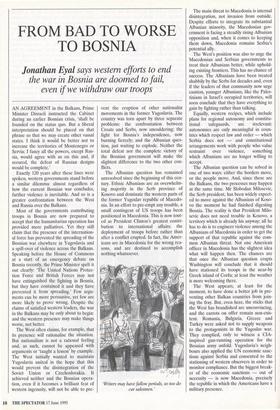FROM BAD TO WORSE TO BOSNIA
Jonathan Eyal says western efforts to end the war in Bosnia are doomed to fail, even if we withdraw our troops
AN AGREEMENT in the Balkans, Prime Minister Disraeli instructed the Cabinet during an earlier Bosnian crisis, 'shall be founded on the status quo. But a liberal interpretation should be placed on that phrase so that we may create other vassal states. I think it would be better not to increase the territories of Montenegro or Servia; I fancy all the powers, except Rus- sia, would agree with us on this and, if secured, the defeat of Russian designs would be complete.'
Exactly 120 years after these lines were spoken, western governments stand before a similar dilemma: almost regardless of how the current Bosnian war concludes, further violence is inevitable. And so is a greater confrontation between the West and Russia over the Balkans.
Most of the governments contributing troops in Bosnia are now prepared to accept that the humanitarian operation has provided mere palliatives. Yet they still claim that the presence of the internation- al force has prevented the spreading of the Bosnian war elsewhere in Yugoslavia and a spill-over of violence across the Balkans. Speaking before the House of Commons at a start of an emergency debate on Bosnia recently, the Prime Minister spelt it out clearly: 'The United Nations Protec- tion Force and British Forces may not have extinguished the fighting in Bosnia, but they have contained it and they have prevented it from spreading.' Few argu- ments can be more persuasive, yet few are more likely to prove wrong. Despite the claims of satisfied western leaders, the war in the Balkans may be only about to begin: and the western presence may make things worse, not better.
The West often claims, for example, that its presence will rationalise the situation. But nationalism is not a rational feeling and, as such, cannot be appeased with arguments or 'taught a lesson' by example. The West initially wanted to maintain Yugoslavia united in the hope that this would prevent the disintegration of the Soviet Union or Czechoslovakia. It achieved neither and the Bosnian opera- tion, even if it becomes a brilliant feat of western ingenuity, will not be able to pre- vent the eruption of other nationalist movements in the former Yugoslavia. The country was torn apart by three separate problems: the confrontation between Croats and Serbs, now smouldering; the fight for Bosnia's independence, now burning fiercely; and the Albanian ques- tion, just waiting to explode. Neither the total defeat nor the complete victory of the Bosnian government will make the slightest difference to the two other con- flicts.
The Albanian question has remained unresolved since the beginning of this cen- tury. Ethnic Albanians are an overwhelm- ing majority in the Serb province of Kosovo and dominate the western parts of the former Yugoslav republic of Macedo- nia. In an effort to pre-empt any trouble, a small contingent of US troops has been positioned in Macedonia. This is now tout- ed as President Clinton's greatest contri- bution to international affairs: the deployment of troops before rather than after a conflict erupted. In fact, the Amer- icans are in Macedonia for the wrong rea- sons, and are destined to accomplish nothing whatsoever.
`Writers may have fallow periods, so too do car salesmen.' The main threat to Macedonia is internal disintegration, not invasion from outside. Despite efforts to integrate its substantial Albanian minority, the Macedonian gov- ernment is facing a steadily rising Albanian opposition and, when it comes to keeping them down, Macedonia remains Serbia's potential ally.
The West's position was also to urge the Macedonian and Serbian governments to treat their Albanians better, while uphold- ing existing frontiers. This has no chance of success. The Albanians have been treated shabbily by the Serbs for decades and, even if the leaders of that community now urge caution, younger Albanians, like the Pales- tinians in Israel's occupied territories, will soon conclude that they have everything to gain by fighting rather than talking.
Equally, western recipes, which include plans for regional autonomy and constitu- tional safeguards, are irrelevant: autonomies are only meaningful in coun- tries which respect law and order — which Serbia does not — and constitutional arrangements work with people who value restraint over violence, something which Albanians are no longer willing to accept.
The Albanian question can be solved in one of two ways: either the borders move, or the people move. And, since these are the Balkans, the two processes may happen at the same time. Mr Slobodan Milosevic, the Serb president, has been widely expect- ed to move against the Albanians of Koso- vo the moment he had finished digesting Bosnia. The reality is that President Milo- sevic does not need trouble in Kosovo, a territory which is already his anyway; all he has to do is to engineer violence among the Albanians of Macedonia in order to get the support of that republic against the com- mon Albanian threat. Not one American officer in Macedonia has the slightest idea what will happen then. The chances are that once the Albanian question erupts Washington will conclude that it should have stationed its troops in the near-by Greek island of Corfu; at least the weather is more welcoming there.
The West appears, at least for the moment, to have done a better job in pre- venting other Balkan countries from join- ing the fray. But, even here, the sticks that the West has brandished are unconvincing, and the carrots on offer remain non-exis- tent. Romania, Bulgaria, Greece and Turkey were asked not to supply weapons to the protagonists in the Yugoslav war. They complied, only to witness a CIA- inspired gun-running operation for the Bosnian army unfold. Yugoslavia's neigh- bours also applied the UN economic sanc- tions against Serbia and consented to the stationing of western observers in order to monitor compliance. But the biggest break- er of the economic sanctions — out of necessity — is now Macedonia, precisely the republic in which the Americans have a military presence. Moreover, the losses to the economies of the region as a result of UN-imposed economic sanctions now run into billions of dollars, but not one western government is prepared to compensate neighbouring countries, despite the fact that compensa- tion is explicitly envisioned in the UN Charter. Finally, the Balkan states are told that they will be rewarded for their travails with 'eventual' membership in Nato and the European Union. Yet the exclusion of Romania and Bulgaria from membership in these institutions is just about the only issue on which western governments now agree. At every level, lies and empty promises work as substitutes for a coher- ent policy. And the worst by-product of the Yugoslav war is just becoming evident: a growing confrontation between Russia and the West.
Russia's claims to have a 'historic affini- ty' with the Slays of the Balkans is risible. The war in Yugoslavia is essentially (but not exclusively) one between Slays. The reality is that the Kremlin cares little for Serbia or any Balkan settlement: all it wants is to make sure that the West will not be allowed to do as it pleased in an area which Russia still considers within its sphere of influence. And the West, far from opposing this development, actually encourages it.
The creation of the so-called Contact Group was a classic exercise in big-power diplomacy, of the kind familiar in the Balkans. Germany, Russia and the United States, with few troops in the area, are members; the Dutch and Canadians are excluded, despite their large contingents in Bosnia. But the Contact Group is a com- plete irrelevance, for the basic outlines of the Bosnian settlement are already clear: Russia will not allow Serbia to be defeat- ed, while the United States will not let the Bosnian Muslims go completely under. The Russians are happy to go along with any deal, as long as these parameters remain unmoved. And they know that time is on their side.
What Moscow failed to achieve under Stalin 50 years ago, it acquired in one night, when Russian soldiers were invited by the West to enter Yugoslav territory. It can be argued that the presence of the Russians is beneficial, a sure token of new East-West co-operation. It is precisely the opposite, for the Russian's main interest is ' to prevent Nato from expanding in the Balkans, and this can be achieved by encouraging further strife.
Because of these successive failures, contempt for western governments is now engulfing the entire Balkan region. The area is unlikely to slide into a generalised war, but the ultimate outcome may be even worse: a system of competing and shifting alliances. Turkey and Bulgaria against Albania; Greece, Serbia, Romania against all others: the opportunities are endless and known to all. The West has no interest in the region; it wants the lid placed on the Balkans as quickly as possi- ble and at whatever cost. And the Russians know that, whichever way the Balkans turn, they will have plenty of fishing opportuni- ties in its troubled waters.
The withdrawal of western forces from Bosnia is now only a matter of time. But the moment the troops get out, the real battle will begin. The United States will have to support the Bosnian government, if only because without this support the lead- ers in Sarajevo may turn to other and less savoury Islamic leaders for help. And the Russian assistance to the Serbs will grow in direct proportion to the American involve- ment on the ground.
The scenario is a typical one for proxy wars, conflicts in which the fate of the pro- tagonists matters less than the calculations of their backers. Disraeli's vassal states are now being' recreated. When this happens, The Spectator can simply reprint its com- mentaries from a previous century: the game is the same, and the disaster is equal- ly guaranteed.
Jonathan Eyal is director of studies at the Royal United Services Institute in London.



































































 Previous page
Previous page